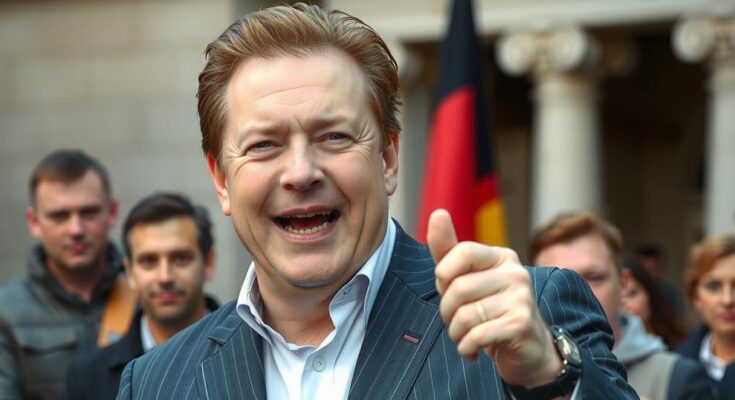Elon Musk has endorsed the far-right AfD party in Germany, stating it can save the country. His support comes amidst criticisms of the party’s extremist positions by political figures like Senator Chris Murphy. The AfD has gained traction in recent polls, despite resistance from other political parties, raising concerns over the rise of nationalist ideologies in Europe.
Elon Musk, the CEO of Tesla and a notable political donor, has publicly endorsed the far-right Alternative for Germany (AfD) party ahead of the upcoming elections, expressing support through a post on social media platform X. Musk stated, “Only the AfD can save Germany,” while sharing content from Naomi Seibt, a far-right influencer. Seibt criticized Germany’s political climate and suggested that the forthcoming chancellor, Friedrich Merz of the CDU, is resistant to the influence of figures like Musk.
Critics, including Senator Chris Murphy from Connecticut, accused Musk of aligning with extreme nationalist ideologies, pointing out that the AfD has undertaken initiatives to normalize Nazi associations within German politics. Murphy asserted that one of the AfD leaders pays homage to Hitler, whereas others have denounced Judaism as an internal adversary.
In response to Musk’s claims, German Chancellor Olaf Scholz rejected the assertion that only the AfD could rescue Germany from its current challenges. Under Scholz, the left-leaning coalition in Germany fractured, and the AfD is now positioning itself as a significant contender in the polls ahead of the February elections. Despite the AfD’s rise, major political parties in Germany largely refuse to ally with it, citing its extremist positions.
Musk’s endorsement of the AfD coincides with an alarming trend across Europe, where far-right parties have gained traction in several nations. The AfD has expressed opposition to military support for Ukraine and advocated for the lifting of sanctions on Russia, views that align with Musk’s known sentiments. Although Tesla has faced difficulties in the European market, Musk’s political endorsements indicate a clear alignment with populist movements both in Europe and in South America, notably endorsing Argentina’s President Javier Milei as well.
Moreover, the AfD has criticized Tesla’s operations in Germany, disputing the economic benefits associated with the company’s Berlin factory, a concern that reflects their broader resistance to the electric vehicle initiative as emblematic of a larger climate agenda that they oppose.
The Alternative for Germany (AfD) party, known for its far-right stances, has gained prominence in German politics, especially in recent state elections. Elon Musk’s endorsement of the AfD during a critical election period underscores the potential influence of right-wing populism in Germany and Europe at large. The party’s ideologies include opposition to immigration, criticism of the European Union, and rejection of mainstream climate science. Such controversies make Musk’s support particularly significant, as it aligns him with figures promoting extreme nationalism and controversial political movements.
In conclusion, Elon Musk’s public endorsement of the far-right Alternative for Germany party highlights a growing intersection between influential business figures and extremist political movements. This support raises concerns over the normalization of extremist ideologies within Western politics, particularly in Germany, where the AfD’s rise challenges traditional democratic values. As far-right parties become more prominent throughout Europe, the implications of these endorsements warrant careful examination by both political analysts and the electorate.
Original Source: www.cnbc.com




